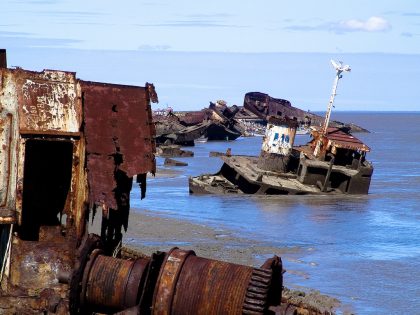Is the world ready to support a Green New Deal for Africa?
The Green New Deal is surely the United States’ most ambitious vision for climate justice to date. But the climate crisis is a global one and Africa is Ground Zero.

Vanderbijl Park, South Africa. Image: World Bank.
When US Representative Alexandria Ocasio-Cortez introduced her now-famous Green New Deal resolution to the press, she called climate change “one of the biggest existential threats to our way of life, not just as a nation but as a world.” To combat the threat, she said, “we must be as ambitious and innovative in our solution as possible.”
The Green New Deal is surely the United States’ most ambitious vision for climate justice to date. But the crisis, as Ocasio-Cortez knows, is a global one. Tackling it equitably, therefore, requires a worldwide effort that accounts for the unique challenges developing nations—particularly those in Africa, the continent considered most vulnerable to global heating—face in reducing greenhouse gas emissions and adapting to climate change. Ocasio-Cortez’s 14-page Green New Deal resolution, however, includes just one sentence concerning the United States’ obligations to the rest of the world. Other Green New Deal proposals that have recently emerged in European countries such as Spain are also largely focused within their own borders.
A Green New Deal, by definition, emphasizes climate justice, which means that domestic decarbonization plans within that framework may be less likely than others to produce damage in other countries. Still, African countries have good reason to be wary of potentially myopic Western climate agendas. In an article for The Conversation this February, Olúfẹ́mi O. Táíwò, a Nigerian professor of philosophy at Georgetown University, raised the concern that such plans could exacerbate “climate colonialism” by exploiting poorer nations’ resources. In Uganda, Mozambique, and Tanzania, for instance, thousands of people have been forcibly evicted from land purchased by a Norwegian company implementing forestry-based carbon offset projects. The Democratic Republic of the Congo, meanwhile, is struggling to manage the surge in demand for cobalt, a key component in the production of electric vehicles and renewable-energy batteries. The DRC has half of the world’s cobalt reserves, and about 20 percent of it is mined by children in dangerous, unregulated mines that the government has proved unable to close.
Previous global climate plans have mostly ignored the needs of the world’s vulnerable people, and that’s particularly true when it comes to climate finance. At COP24, the 2018 version of the United Nations Climate Change Conference, the chair of the Least Developed Countries Group—a body representing 48 nations that are especially vulnerable to climate change but have done the least to cause the problem—told the leaders of developed nations that merely making their own domestic climate plans more ambitious won’t be enough to address the global crisis. Gebru Jember Endalew, from Ethiopia, said for developing nations, “trillions of dollars in climate finance (are) needed to cover the costs of adapting to climate change impacts, coping with loss and damage, and pursuing clean development pathways to avoid emissions.”
The Green Climate Fund, which was created at COP16 in 2010, exists to manage those kinds of investments, but it’s being grossly neglected. Initially, developed countries agreed to contribute $100 billion to the fund annually by 2020. To date, however, only $10.3 billion has been pledged and only $3.5 billion has actually been committed. African countries, meanwhile, are “on a perpetual treadmill of paperwork” as they struggle to access what limited funds are earmarked for them.
Recent proposals for a planet-wide Green New Deal seek to make climate finance a powerful instrument of climate justice. Yanis Varoufakis and David Adler of the Democracy in Europe Movement have proposed an International Green New Deal that would raise $8 trillion annually for renewable energy investment and climate protections “on the basis of countries’ needs, rather than their means.” People’s Policy Project, a socialist think tank, has a plan for a Global Green New Deal, which calls on the United States to transfer $680 billion a year to the Green Climate Fund, and for other OECD nations to contribute their fair share. Such proposals don’t just make sense morally; they also make sense scientifically. Greenhouse gas emissions are rising precipitously in developing countries. To avoid a planetary catastrophe, developed nations must give developing nations the technical and financial support they need to transition to low carbon economies.
Are Africans clamoring for such a transition? Not exactly. A recent Bloomberg look at global polls revealed that among voters in three African nations—Kenya, Nigeria, and South Africa–climate concerns are far outweighed by everyday anxieties about employment and security. In an article for the the South African Mail & Guardian, for example, the University of Cape Town’s Co-Pierre Georg argued that South Africa needs to first improve education, create jobs, and strengthen the agricultural sector before it can worry about the planet. What such arguments miss is that the line between economic development and climate adaptation in Africa is a blurry one, and it will only get blurrier as the planet gets hotter.
The American Green New Deal, after a resounding defeat in the Senate in March, remains a gleam in Ocasio-Cortez’s eye. International proposals that share its emphasis on climate justice are even further from political reality. For African leaders who are concerned about the climate crisis, that could be seen as greatly discouraging. But it could also be greatly hopeful, as it means that there’s still time to push the international community toward a truly “ambitious and innovative” climate plan—one that works not just for Western nations, but for the entire world.













